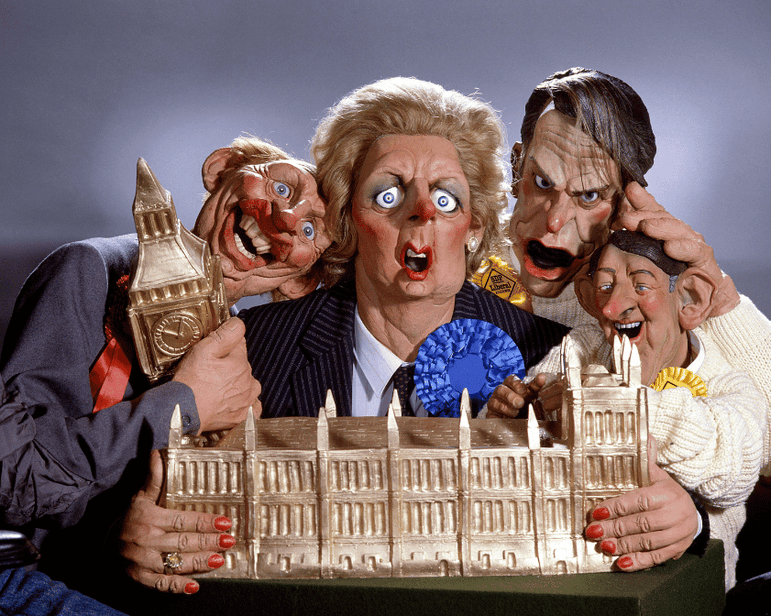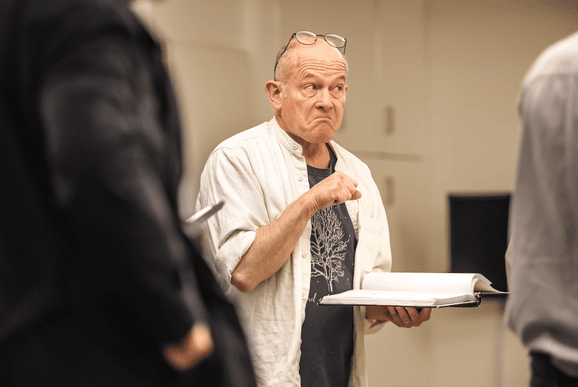
News Story
In June 2024, we welcomed Party Games! to the Connaught Theatre. Chock-full of satirical commentary and familiar references, it is sure to make for a great night out. Find out more about the play and the history of satire here.
Party Games! by Michael McManus: What’s it about?
Party Games! is a new political comedy, heavily influenced by recent events to imagine a not-so-distant future of government turmoil. Key events from recent years that have influenced the satire include Brexit, frequent cabinet reshuffles, rail strikes, the stripping down of NHS services, and national opinions on the monarchy. It also incorporates current discourse on the presence (or rather, omnipresence) of AI, gender identities, and politics vs celebrity culture.

Joanna Read directing the cast
Credit: Craig Fuller
Matthew Cottle
Credit: Craig FullerThe play follows John Waggner (Matthew Cottle) in his first week as leader of a newly elected party. He presides over a shaky government and a country gently teetering on the brink of collapse. Flickering lights and talk of strikes from food manufacturers indicate the unrest across the country. After enlisting the help of a manipulative spin-doctor, the bumbling and floundering Waggner seems entirely out of his depth and out of step with the rest of his team. The play pokes fun at the entitlement and buffoonery of politicians who gain popularity through personality alone, and how they fare when they have to make real decisions.
Political Theatre Through History
What is Satire?
Satire is a comedy that pokes fun at established political and social mores. Its origins in Western culture lie in ancient Greek theatre, specifically attributed to the comedic writer Aristophanes, whose work has survived to today. Satire evolved over the centuries from comedic poems that ridiculed society and religion. The dawn of print media saw a rise in satirical cartoons and political magazines, then radio and TV became established formats for satire. Examples of popular British satire from the last few decades include the grotesque and irreverent puppet show Spitting Image, satirical panel show Have I Got News For You, Armando Iannucci’s The Thick of It, and impressions show Dead Ringers on both TV and radio.
Party Games! Star Debra Stephenson is no stranger to satire. Well known for her impersonations, she has worked on Dead Ringers for the last 10 years and portrayed characters on Spitting Image. The form of satire is as far-reaching and broad as the political, social, and cultural landscapes it mocks.

British Political Theatre & Censorship Laws
Whilst satire comes in many forms, British theatre has a slightly more disrupted history regarding politics. Although earlier playwrights such as Shakespeare and Christopher Marlowe dabbled in satire and politics, there was a centuries-long period where it was a complex subject. In the late 17th century, censorship laws were enacted to protect the British government from political derision on stage. Of course, theatrical satire still existed, particularly in the 19th and 20th centuries through writers such as Gilbert & Sullivan, Oscar Wilde, George Bernard Shaw and Noël Coward. But, compared to their European contemporaries, the work of British writers leaned towards gentle critiques of society rather than politics.

Party Games! cast in rehearsal (Jason Callendar, Natalie Dunn, Debra Stephenson)
Credit: Craig Fuller
William Oxborrow
Credit: Craig FullerMeanwhile, across the channel, overtly political, socially critical, and theatrically revolutionary writers emerged at this time. Writers such as Henrik Ibsen, Anton Chekov and Bertold Brecht. The British government controlled performance licences and censored content, positioning itself as the arbiters of taste and morality on stage. When European work transferred to British stages, the text was sanitised. Productions were often met with opposition from those who considered the work offensive to British sensibilities.
Many established theatre makers have tried to abolish this act over the centuries, longing to be liberated from strict censorship. However, the laws stayed in place right up until 1968. Less than 60 years since the Theatres Act, we have seen an explosion of political theatre, satire on stage, and work that pointedly criticises British culture, politics and society from writers of all kinds. Satire is an established cultural staple in the UK and an important tool in grappling with current political issues.
Who is Michael McManus?
Between 1992 and 1995, McManus worked as a special adviser to several ministers, giving him an insider’s understanding of Westminster. He was Head of Sir Edward Heath’s private office from 1995 to 2000 and the Conservative Party candidate for Watford in 2001. Before transitioning into playwriting in 2018, he ran the Press Complaints Commission (later IPSO) from 2012 to 2014. Party Games! is his fifth play to go into full production.

Party Games! The cast in rehearsals
Credit: Craig FullerMcManus’s extensive experience within government gives his work an air of authenticity, even (or perhaps especially) when leaning towards absurdity. His goal is to fulfil a niche and write “a good, mischievous, right-wing play”, in the words of Nicholas Hytner. It is well known that artists, especially theatre makers, tend to be more socially liberal and left-leaning. But McManus recognises that, for an art form which prides itself on reflecting society, it can be distinctly one-sided.
Writing from ConservativeHome.com in 2018, during the initial run of his first play, An Honourable Man, McManus said: “The brutal fact is, in June 2016, 17 million voters rejected the political status quo and they had their reasons. I believe passionately that, if this country is to have any chance of moving forward from its current existential crisis… some brutal truths about modern life do need to be faced; and theatre is precisely the appropriate “safe space” to do so.”
Party Games! was on at the Connaught Theatre in May 2024.